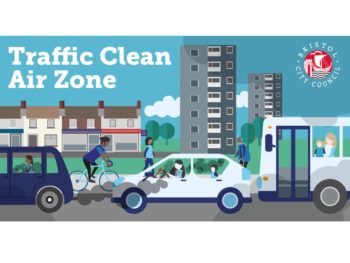Bristol City Council may become the first place in the UK to introduce a diesel vehicle ban under plans that are causing controversy – but may not actually clean up air as soon as needed.

The council has come under government pressure for several years to cut air pollution; it was one of 27 that were named in Defra’s 2017 clean air plans and told that they needed to undertake action to consider the best option to achieve statutory nitrogen dioxide (NO2) limit values within the shortest possible time.
But although the council came up with a number of possible Clean Air Zone options a year ago, it has missed deadlines to submit a preferred option, citing concerns over the impact of any scheme on low-income residents.
It now believes it’s found a solution and latest plans – currently awaiting approval by the council’s Cabinet and planned to go live by March 2021 – would see the introduction of a small area diesel ban for all privately owned vehicles, potentially including vans, alongside a charging zone for non-compliant commercial vehicles such as buses, taxis, HGVs and LGVs. A car scrappage scheme would also be launched and further measures for tackling air quality through improving and prioritising public transport options have also been suggested.
The proposals support the Mayor of Bristol’s pledge to reduce the reliance on cars and increase the number of bus users.
Mayor of Bristol, Marvin Rees said: “These ambitious plans demonstrate our commitment to tackling air pollution so we meet legal limits within the shortest time, without disproportionately affecting citizens on lower incomes which would happen with a blanket approach to charging vehicles.
“Protecting the most vulnerable people from pollution is central to these plans and we have ensured that all impacts have been carefully considered. If approved, mitigation measures will support those most affected, especially those living in the most deprived communities.”
The diesel ban plans have been slammed by motoring-related organisations. The AA said: “Diesel is the fuel used not only by ambulances, fire engines and buses but also essential services such as breakdown rescue, firms that make urgent deliveries such as to pharmacies, that unblock drains, plumbers and others that residents depend on.”
And RAC head of roads policy Nicholas Lyes said the impact of the proposals on people who currently drive diesel vehicles would be “unprecedented”, and that they risk causing congestion problems where they don’t exist at the moment.
“Bristol has bold plans to improve its public transport system, but major improvements like its mooted rapid transit system or even more park and ride sites are still many years from becoming a reality. In the meantime, many drivers are faced with having to use their car for journeys in and around the city simply because there is no affordable, reliable alternatives. This would become more difficult under these plans.”
He also warned of the financial impact on drivers, including those locked into finance packages and facing significant early termination penalties.
“The devil will be in the detail, but we are concerned that a scrappage scheme would not prove effective in getting people into cleaner cars, since such schemes are designed to get people into brand-new – and still more costly – vehicles,” he continued.
Meanwhile the Freight Transport Association (FTA) said the plans’ lack of detail was “alarming and leaves local businesses in the dark on how to proceed with business planning”.
Chris Yarsley, FTA’s policy manager for the South West of England, continued: “Will the ban operate at peak hours or 24/7? While previous consultations only discussed a ban on cars, it is now unclear whether lorries and vans will also be included. If so, how does the council expect goods to be delivered to supermarkets, businesses and homes? There are currently no viable alternatives to diesel-run lorries. Furthermore, the proposed scrappage scheme appears to only be open to residents of private cars – what help will be provided to commercial vehicle operators and those who need LCVs for their jobs, including self-employed business people?
“While FTA and its members support the council’s commitment to improving air quality in the city, announcing a proposed scheme with such little detail is unfair to the businesses and individuals who work tirelessly to keep the local economy afloat.”
Meanwhile campaign group ClientEarth has also said it’s not impressed by the plans – but because they don’t go far enough. The firm’s clean air lawyer Katie Nield said: “While these new plans represent a step in the right direction, they once again stop short of ridding the city of its illegally toxic air with the necessary urgency. It is not right that people in Bristol will have to wait until 2025 to breathe cleaner air when cities across the country are doing it much sooner. Air pollution disproportionally affects the most vulnerable members of our communities including those from poorer households. The Mayor should be protecting them now.
“Following our legal challenge against the UK government, the High Court was clear: air quality plans have to do everything possible to protect people’s health from illegal levels of air pollution. The UK government, the Mayor and the City Council must start putting people’s health first.”
The council’s Outline Business Case (OBC) will be presented at the cabinet meeting on Tuesday 5 November 2019. If approved by cabinet, the OBC will be submitted to the Joint Air Quality Unit (JAQU) on Wednesday 6 November

